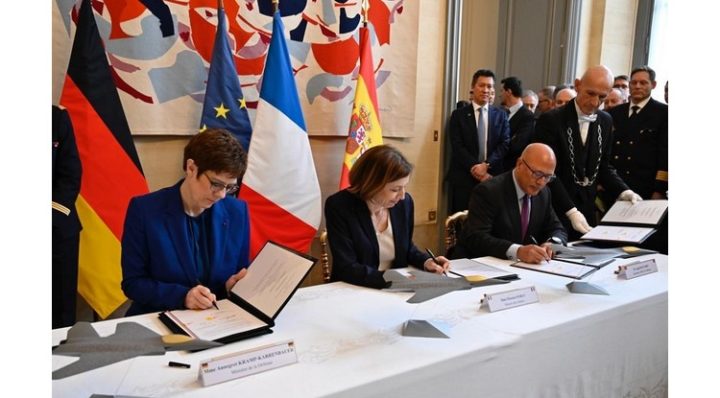· Mounir Satouri (Greens/EFA, EELV)
· Jordi Solé i Ferrando (Greens/EFA, Esquerra Republicana de Catalunya)
· Diana Riba i Giner (Greens/EFA, Esquerra Republicana de Catalunya)
· Özlem Demirel (GUE, Die Linke)
Germany, Spain and France have entered, these past few months, into a defense industrial partnership which could prove irreversible in Europeanizing French deterrence. Berlin and Madrid’s commitment to a long-term industrial partnership with France for the Future Combat Air System (FCAS) will most probably lead to sharing France’s “nuclear burden”. These governments carefully avoid discussing publicly this matter, which poses a real issue for our democracies.
France is the only EU Member State that possesses a nuclear arsenal: 300 nuclear weapons divided between submarine and air forces. In addition to constant modernization, Paris has just launched a program to renew its entire nuclear arsenal. It is true that US nuclear weapons are deployed on German territory in the framework of NATO, in Büchel. But like Spain, Germany has taken the commitment – under the Treaty on the Non-Proliferation of Nuclear Weapons (NPT) – never to contribute to the development of a nuclear arsenal. In addition, all three States took the commitment “to pursue negotiations in good faith […] at an early date […] on effective measures relating to cessation of the nuclear arms race [and] to nuclear disarmament”, under article VI of the NPT.
From the very beginning of his presidency, Emmanuel Macron has shown a clear desire to strengthen not only the Europeanisation of defence policy, but also that of nuclear deterrence. His will to see the emergence of a European strategic culture cannot be dissociated from that of gaining acceptance for French nuclear deterrence, including acceptance for the doctrine of “nuclear-warning”. The latter consists of a nuclear head of 300 kilotons (20 times the bomb dropped on Hiroshima) being fired in first use by a Rafale of the Strategic Air Forces.
In February 2020, President Macron unveiled further his ambitions, calling for the development of a strategic dialogue “with our European partners […] on the role played by France’s nuclear deterrence in our collective security”, and inviting EU Member States (Germany, Spain?) to “be associated with the exercises of French deterrence forces”. The Rubicon has been crossed. France is inviting EU Member States to renounce their “good faith” commitments taken under the NPT.
Germany and Spain have both remained silent publicly on this invitation to join nuclear exercises. However, we are surprised to see that, without any real public debate on the nuclear stakes of this program, they are engaging in an industrial partnership for the FCAS. This Franco-German-Spanish project is the largest armament project of the century. First estimates are of the range of €100 billion of public funds. Already in the 2021-2024 phase (1B), these States will spend €3.5 billion (only for the FCAS); a cost shared equally among them.
As announced, this Future Combat Airforce will be nuclear-capable, so that France can replace the Rafale by 2040 and renew its Strategic Air Forces. Yet, in his audition at the French National Assembly on March 17 2021, General Eberhard Zorn, Generalinspekteur of the Bundeswehr, stated that “regarding nuclear matters and nuclear deterrence, I am unaware of what the projects concerning the FCAS are and its potential fitting with nuclear weapons”.
This answer clearly reflects the refusal of the German authorities to communicate on this sensitive topic. Are we asked to ignore the elephant in the room? On June 23rd, the Bundestag will vote on the €4.5 billion required to develop a demonstrator for 2027. How is it that no German parliamentarian or citizen was informed that German public funds are going to finance a delivery system for French nuclear weapons? Spanish citizens also seem to have missed this information – while 89% of Spaniards are in favor of Spain’s adhesion to the Treaty on the Prohibition of Nuclear Weapons (YouGov, November 2020).
By committing to this program, which has a nuclear dimension, do the German and Spanish governments want to endorse a future nuclearization of European defense? One thing is for certain, for the French government, this project is not only an industrial undertaking. It is a foot in the door to keep the Europeanization of French deterrence on the table.
Our democracies deserve full transparency and a real, in-depth debate on this issue that concerns current and future generations. Nothing is irreversibly decided yet. It is still time to question the purposes of the project.
The actions of our States in this domain draw attention from all over the world. We must invest in the security architecture of this continent by strengthening global nuclear non-proliferation, not by accelerating its erosion.
We built a partnership across Europe to seek lasting peace, not to engage in military nuclear cooperation. We must work to protect human security and stability in Europe and the world, and not to increase ever-greater nuclear risks.












